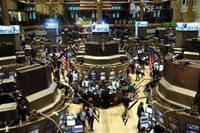American stocks still sink
Stocks slipped Thursday as Wall Street took a breather from this week's rally.

Wall Street held onto most of its recent gains, though, thanks to a strong third-quarter results from Goldman Sachs and a drop in jobless claims. The Labor Department said jobless claims declined by 9,000 last week - a good sign for the economy, particularly given August's decrease in payrolls.
Investors were also relieved that Goldman Sachs Group Inc. reported a surprisingly large 79 percent rise in profit, and managed to hedge losses in subprime mortgages during the tumultuous third quarter. In August, stocks plunged and credit markets tightened up due largely to problems in the housing market.
Bear Stearns & Cos. didn't weather the storm as well, and suffered a larger-than-anticipated 62 percent profit drop. Electronics retailer Circuit City Stores Inc. also posted a big quarterly loss that troubled Wall Street, sending its shares tumbling.
With the Dow Jones industrials up about 400 points since the Fed's rate cut Tuesday, investors now appear unsure where to take the market and hungry for more clues about the health of the economy and corporate America.
The market is likely to be driven by earnings over the coming weeks, said Doug Roberts, chief investment strategist for Channel Capital Research. "The market will start to stabilize. You'll see some backing and filling in the market, which you're seeing right now," he said.
Fed Chairman Ben Bernanke's testimony Thursday about the mortgage and credit markets before the House Financial Services Committee gave stocks little direction. Bernanke said the credit crisis has created "significant market stress" and reassured the market that regulators are willing to step in to curb the fallout, but he did not hint at what the central bank's next move on interest rates might be.
In midday trading, the Dow slipped 18.21, or 0.13 percent, to 13,797.35.
Broader stock indexes also declined modestly. The Standard & Poor's 500 index fell 4.07, or 0.27 percent, to 1,524.96, and the technology-dominated Nasdaq composite index fell 4.77, or 0.18 percent, to 2,661.71.
The Russell 2000 index of smaller companies was down 2.71, or 0.33 percent, at 814.69.
Declining issues outnumbered advancers by about 3 to 2 on the New York Stock Exchange, where volume came to 542.8 million shares.
Bonds fell, pushing the yield on the benchmark 10-year Treasury note up to 4.61 percent from 4.52 percent late Wednesday. Prices dampened due to concerns that U.S. rate cuts will spur inflation and that Saudi Arabia may lighten its Treasury holdings.
In other economic data Thursday, the Conference Board's August index of leading economic indicators declined, as expected.
Wall Street is split on what the Fed will do when it meets again in October - many predict a quarter-point rate decrease, but others expect policy makers to keep the target fed funds rate steady at 4.75 percent.
The main reason the central bank may be against another rate cut is the risk of inflation. Core inflation, which strips out food and energy prices, has been stable in recent months, but could accelerate if the effects of high food and energy prices trickle down to other consumer prices.
"The one thing we're going to be susceptible to is data shocks, especially on the inflation front," Roberts said.
Crude oil prices crept further into record territory on the New York Mercantile Exchange, rising 27 cents to $82.20 a barrel. Gold prices also rose, extending their recent streak.
Meanwhile, the dollar fell to a new low against the euro, which surpassed $1.40 for the first time since the 13-nation currency was introduced in 1999. A weak dollar is a double-edged sword for the U.S. economy - it makes imported goods more expensive for Americans, but it makes U.S. exports cheaper, and thus more attractive, to foreign buyers.
Goldman shares rose $2.60 to $208.10 after releasing its earnings.
Bear Stearns shares initially fell, but then rebounded to trade up $3.13, or 2.6 percent, at $118.77 after the company's chief financial officer said in a conference call that the worst appears to be over. Bear Stearns' stock has been battered in recent months. Over the summer, two of its hedge funds that bet on mortgage debt went bankrupt, and the news led to a selloff in its own stock and throughout the industry.
Circuit City plunged $1.81, or 17 percent, to $8.76.
In deal-making news, Nasdaq Stock Market Inc. and Borse Dubai announced that Nasdaq will take over Nordic bourse operator OMX AB, while Borse Dubai will buy about 20 percent of Nasdaq and 28 percent of the London stock exchange. Nasdaq rose $1.05, or 2.9 percent, to $37.07.
Subscribe to Pravda.Ru Telegram channel, Facebook, RSS!




